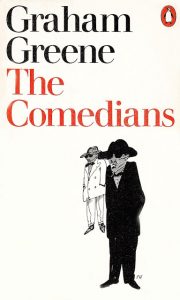 Graham Greene’s novel about François Duvalier’s Haiti begins at sea, on a boat bound for Port-au-Prince from New York. What sort of people voyage towards a dictatorship of the worst kind, where armed men enforce a nightly curfew and the laws are subject to the whims of the powerful? There is Mr. Smith, an American who ran an unsuccessful presidential campaign against Harry Truman; Major Jones, a gambler under investigation by the police; and Mr. Brown, the novel’s protagonist, who has inherited a hotel in Haiti – which he calls “the dark republic” – and is returning to Port-au-Prince reluctantly, having been unable to find a brave or naive buyer in New York. They are the comedians of the novel’s title, but it is their common fate to have wandered into a tragedy.
Graham Greene’s novel about François Duvalier’s Haiti begins at sea, on a boat bound for Port-au-Prince from New York. What sort of people voyage towards a dictatorship of the worst kind, where armed men enforce a nightly curfew and the laws are subject to the whims of the powerful? There is Mr. Smith, an American who ran an unsuccessful presidential campaign against Harry Truman; Major Jones, a gambler under investigation by the police; and Mr. Brown, the novel’s protagonist, who has inherited a hotel in Haiti – which he calls “the dark republic” – and is returning to Port-au-Prince reluctantly, having been unable to find a brave or naive buyer in New York. They are the comedians of the novel’s title, but it is their common fate to have wandered into a tragedy.
François Duvalier does not appear in the novel, but his presence is everywhere felt as a kind of menace. The locals – most of whom are starving, many of whom have been maimed or crippled in encounters with Duvalier’s secret police – refer to him as “Baron Samedi,” a voodoo figure who stalks graveyards. It is a comparison Duvalier himself invited, both in the tone of voice he affected and in the dark sunglasses he wore. His secret police, the Tonton Macoute (Haitian Creole for “boogeymen”), likewise wear menacing dark glasses as they go about systematically terrorizing the citizenry. We get some idea of their effectiveness early on, when Jones arrives at his hotel to find that Dr. Philipot, once a government minister, has committed suicide in the hotel pool, preferring to die by his own hand than at the hands of the Tonton Macoute, who are looking for him.
Brown originally arrived in Haiti before Duvalier’s reign, when a letter from his estranged mother, sent on her deathbed, beckoned him. She had come into possession of the hotel through a lover, and now she, hours from death, wished to leave it to him. Through his reminiscences, we learn something of his childhood: he was born in Monte Carlo, never met his father, received a Jesuit education and spent his young adulthood selling counterfeit art to gullible aristocrats with bad taste. The hotel is his only possession in the world, the closest thing he has ever had to a home, and so, against his wishes, his fate and Haiti’s are interlinked. The other comedians are Mr. Smith and Major Jones. Smith is visiting Haiti with his wife, and the pair have a missionary zeal: it is their ambition to promote vegetarianism in Haiti, and to establish an organization there to promulgate vegetarian literature and media. This, it turns out, was the crux of Mr. Smith’s presidential bid; they share a philosophy that suggests that meat-eating is the ultimate cause of human violence. That their cause is unnecessary in a country like Haiti, where the masses are too poor to afford meat, is lost on them.
Major Jones is the final comedian, and it is shortly revealed that despite his narrative, he has had no military experience and certainly never held a title. His business in Haiti is self-enrichment, and his method is a dangerous one: he plans to scam the Duvalier government out of hundreds of thousands of dollars by posing as an arms dealer, or someone who could broker an arms trade. Smith and Jones might be viewed allegorically, the two sides of Western interest in Haiti: shameless exploitation coupled with a naive – and therefore useless – desire to help. The comedians have a foil in Dr. Magiot, a native Haitian with an actual profession, and one associated with healing. He leaves Brown a letter, towards the end of the novel, in which he suggests that the greatest crime is not malevolence, necessarily, but indifference:
We are humanists, you and I. You won’t admit it perhaps, but you are the son of your mother and you once took the dangerous journey which we all have to take before the end. Catholics and Communists have committed great crimes, but at least they have not stood aside, like an established society, and been indifferent. I would rather have blood on my hands than water like Pilate.
The Comedians was immediately banned in Haiti upon its publication, and Duvalier himself wrote to denounce it. He had no choice, because Greene gave him none. The Comedians permits no indifference, not from its readers and not from the dictator whose country it depicts in horrifying detail.